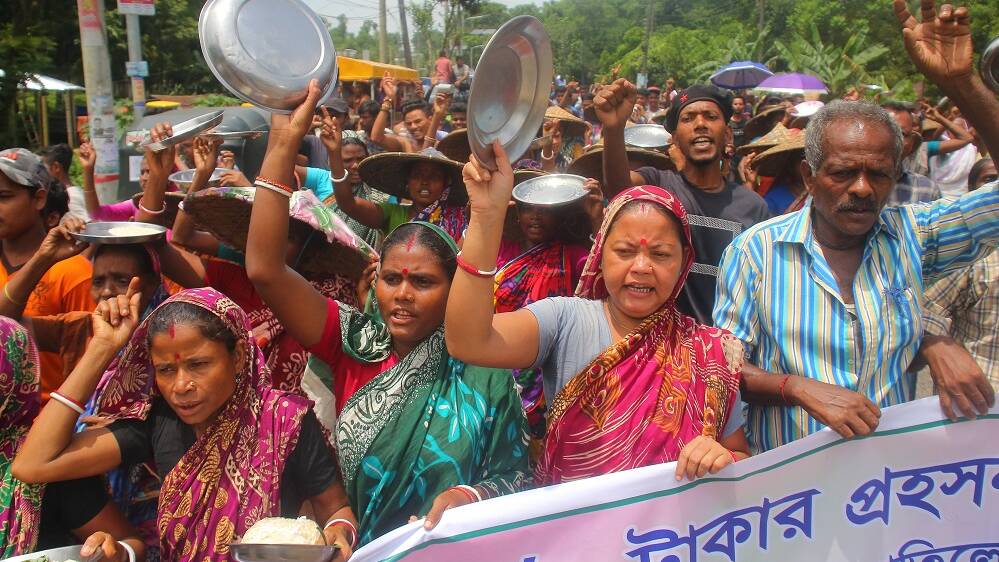Global Social Rights

The Rosa Luxemburg Foundation is driven by the vision of a world that guarantees social justice. Our global social rights work aims to strengthen the discourse around social rights and actors who are active in this field globally — because social rights must always be global social rights.
Historical colonial and imperialist continuities as well as the ongoing expansion of capitalism continue to shape global relations of power and domination to this day. Transnational corporations undermine human rights, environmental protection, and workers’ rights. To do so, they draw on international agreements that protect the rights of private investors and so-called “free trade”.
For these corporations, international law has largely become an instrument of domination to assert their interests. Their actions are closely linked to the “imperial mode of living” of the countries of the Global North — externalizing their social and ecological costs onto the Global South while sealing off their borders — and a frightening normalization of right-populist and xenophobic political attitudes.
Yet there is also a body of social rights at the international level. The 1948 Universal Declaration of Human Rights, passed by the United Nations General Assembly, contains a clear commitment to the indivisibility and interdependence of political and social human rights. The UN Social Covenant, adopted in 1966, codifies far-reaching legal standards, with signatory states making a legally binding commitment to implement at least the core substance of these rights. The conventions of the International Labour Organization provide a framework for the international implementation of minimum labour standards, and the protection of the rights of migrant workers and indigenous peoples. Moreover, social rights are also enshrined in the European Social Charter.
In the 1990s and 2000s, alter-globalization movements, trade unions, and non-governmental organizations kicked off a debate on “Global Social Rights” that took these agreements as their point of departure. The demand at that time was to counter the globalization of capital, markets, and goods with a globalization of social rights. The global financial crisis that began in 2008 put a temporary end to this discussion.
But not for long: the Arab Spring reignited the struggle for social rights in 2011. The “movements of the squares” in Southern Europe and Occupy Wall Street in the US opposed the politics of neoliberal authoritarianism. International campaigns like the Clean Clothes Campaign began to amplify workers’ struggles for rights in the production chains of the global garment industry. Transnational social movements for climate justice and energy democracy also gained strength, as did the globally networked landless movement Vía Campesina, which had already existed for many years.
One starting point of these movements, networks, and struggles was to develop transnational and rights-based responses to global social conflicts and the underlying inequality between North and South. This aspect was also included in the 2030 Agenda for Sustainable Development, adopted by the UN member states in 2015. The agenda formulates 17 Sustainable Development Goals (SDGs). An important stipulation of the 2030 Agenda is that human rights should form the basis of the SDGs.
As the model of the imperial mode of living and its economic foundation, the capitalist dogma of constant economic growth, appear to be reaching their limits, global social justice is becoming more than just an ethical or political question. The externalized costs of unequal globalization are already catching up with us today in the form of things like climate change. The current global socio-ecological challenges and the accompanying social conflicts, including environmental changes but also growing refugee and migration movements, corresponding risks of violent conflicts, resource scarcity, and extreme exploitation in transnational value chains make a transnational legal framework that effectively grounds Global Social Rights urgently necessary.
Against this backdrop, the Rosa Luxemburg Foundation endeavours to rekindle the debate on Global Social Rights within the broader Left and organized civil society, adapting the term to various political contexts and struggles, such as workers’ struggles and anti-capitalism, the fight against sexist oppression, racism, as well as (neo)-colonial structures and contemporary border regimes. For us, the implementation of social, economic, and cultural human rights is a prerequisite to realizing civil and political human rights for all people, regardless of nationality, gender, skin colour, or religious affiliation. Our work on Global Social Rights takes on the capitalist, growth-oriented development model, which, interwoven with racist and sexist oppression, both creates as well as cements social inequalities.
Contact:
| Role | Details |
|---|---|
| Social Rights Programme Director | Eva Wuchold Email: eva.wuchold@rosalux.org Phone: +41 22 42015 15 |